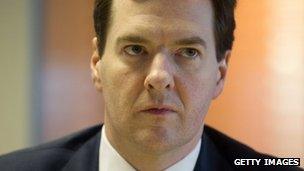Osborne: Balls not personally involved in Libor scandal
- Published

The chancellor has said that Ed Balls was not personally involved in the Libor rate-rigging scandal, as Labour agreed to co-operate with a parliamentary inquiry into the affair.
George Osborne said on Wednesday that his Labour counterpart had "questions to answer" over the scandal.
But Mr Osborne's aides told the BBC's Nick Robinson they accept that Mr Balls had not intervened in the affair.
Meanwhile, Labour said it would continue to push for a public inquiry.
Libor is the average rate of interest paid by the banks lending to each other, and is calculated on a daily basis by the British Bankers' Association from estimates submitted by the major international banks based in London.
Staff at Barclays filed misleading figures to hide the extent to which it was under financial stress, but at least a dozen other banks are now being investigated to find out whether were also attempting to rig the rate.
'Cheap, partisan and desperate'
MPs decided that the government's preferred option of creating a joint committee of MPs and peers was the best way to investigate the scandal, after a heated Commons debate in which Mr Balls repeatedly demanded an apology from the chancellor.
In an interview with the Spectator on Wednesday, Mr Osborne said "people around Gordon Brown" while he was PM had "questions to answer" over allegations from Barclays that "senior Whitehall figures" had put pressure on them to post artificially low Libor rates.
"My opposite number was the City minister for part of this period and Gordon Brown's right hand man for all of it. So he has questions to answer as well. That's Ed Balls, by the way," he added.
During the Commons debate, Mr Osborne urged his shadow counterpart to "explain what Labour's involvement was, who were the ministers, who had the conversation, who were the senior figures".
But Mr Balls called on the chancellor to withdraw the "false, personal accusations", describing them as "cheap, partisan and desperate".
After the debate, the chancellor's aides told BBC political editor Nick Robinson that Mr Osborne now accepted that Mr Balls had taken part in no such conversations.
Labour voted against the creation of a parliamentary committee to investigate the scandal after their bid to launch a judge-led inquiry was rejected by 320 votes to 239, a government majority of 81.
The Commons backed the parliamentary inquiry by 330 votes to 226, a majority of 104.
'Grave error'
Mr Balls said Labour respected the will of Parliament but had concerns over the scope and membership of the proposed committee and argued that its remit was too "narrow".
"The prime minister and the chancellor have made a very grave error of judgement," he told MPs after the vote.
"And any time any future scandals emerge, people will ask why are we not having the full independent inquiry that this country needs?"
The committee will investigate "professional standards in the banking industry" including the manipulation of a key inter-bank borrowing rate by Barclays traders - for which it was fined £290m.
The scandal has led to the exits of three senior Barclays executives and calls for action.
Mr Osborne has said he wants to see a change in the law to ensure this could never happen again.
The committee should start work as soon as possible, he argues.
The inquiry will be chaired by Conservative MP Andrew Tyrie, who told MPs that it was essential it commanded cross-party support and reported quickly.